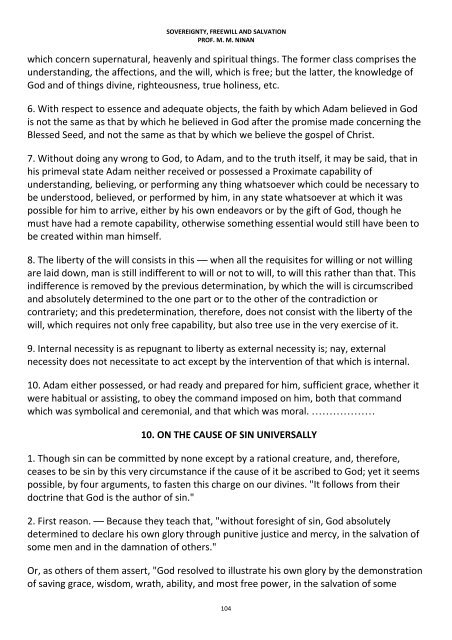Calvinism and Arminianism
You also want an ePaper? Increase the reach of your titles
YUMPU automatically turns print PDFs into web optimized ePapers that Google loves.
SOVEREIGNTY, FREEWILL AND SALVATION<br />
PROF. M. M. NINAN<br />
which concern supernatural, heavenly <strong>and</strong> spiritual things. The former class comprises the<br />
underst<strong>and</strong>ing, the affections, <strong>and</strong> the will, which is free; but the latter, the knowledge of<br />
God <strong>and</strong> of things divine, righteousness, true holiness, etc.<br />
6. With respect to essence <strong>and</strong> adequate objects, the faith by which Adam believed in God<br />
is not the same as that by which he believed in God after the promise made concerning the<br />
Blessed Seed, <strong>and</strong> not the same as that by which we believe the gospel of Christ.<br />
7. Without doing any wrong to God, to Adam, <strong>and</strong> to the truth itself, it may be said, that in<br />
his primeval state Adam neither received or possessed a Proximate capability of<br />
underst<strong>and</strong>ing, believing, or performing any thing whatsoever which could be necessary to<br />
be understood, believed, or performed by him, in any state whatsoever at which it was<br />
possible for him to arrive, either by his own endeavors or by the gift of God, though he<br />
must have had a remote capability, otherwise something essential would still have been to<br />
be created within man himself.<br />
8. The liberty of the will consists in this — when all the requisites for willing or not willing<br />
are laid down, man is still indifferent to will or not to will, to will this rather than that. This<br />
indifference is removed by the previous determination, by which the will is circumscribed<br />
<strong>and</strong> absolutely determined to the one part or to the other of the contradiction or<br />
contrariety; <strong>and</strong> this predetermination, therefore, does not consist with the liberty of the<br />
will, which requires not only free capability, but also tree use in the very exercise of it.<br />
9. Internal necessity is as repugnant to liberty as external necessity is; nay, external<br />
necessity does not necessitate to act except by the intervention of that which is internal.<br />
10. Adam either possessed, or had ready <strong>and</strong> prepared for him, sufficient grace, whether it<br />
were habitual or assisting, to obey the comm<strong>and</strong> imposed on him, both that comm<strong>and</strong><br />
which was symbolical <strong>and</strong> ceremonial, <strong>and</strong> that which was moral. ………………<br />
10. ON THE CAUSE OF SIN UNIVERSALLY<br />
1. Though sin can be committed by none except by a rational creature, <strong>and</strong>, therefore,<br />
ceases to be sin by this very circumstance if the cause of it be ascribed to God; yet it seems<br />
possible, by four arguments, to fasten this charge on our divines. "It follows from their<br />
doctrine that God is the author of sin."<br />
2. First reason. — Because they teach that, "without foresight of sin, God absolutely<br />
determined to declare his own glory through punitive justice <strong>and</strong> mercy, in the salvation of<br />
some men <strong>and</strong> in the damnation of others."<br />
Or, as others of them assert, "God resolved to illustrate his own glory by the demonstration<br />
of saving grace, wisdom, wrath, ability, <strong>and</strong> most free power, in the salvation of some<br />
104

















